#da: analysis
Explore tagged Tumblr posts
Text
Blackwall's Age & The Grand Tourney
this one is for the blackwall enjoyers, the hawke and trevelyan havers, the free marches enjoyers, and the lore enthusiasts. i think the tourney is neat and we only have crumbs for the marches outside of kirkwall. i want to see more da ocs with the tourney as part of their backstory!!
thom rainier was born in 8:93, 8:96, 0r 8:99 blessed, making him either 48, 45, or 42 at the beginning of inquisition in 9:41 dragon, and the winner of the tourney in 9:11, 9:14, or 9:17 dragon.
blackwall won the grand tourney when he was 18, per his updated codex entry[1]. the grand tourney is held roughly every three years. specifically every 1,000 days[2], but using the known years we have in canon, it works out to every three years perfectly. back in 2014, weekes said solas looked to be in his early to mid 40s, and that he and blackwall have "kids these days" talks[3], implying they're around the same age. he also just looks to be 40-50.
putting all the years i mapped out (from the first date we have to the last) and the sources below in the read more. bolded years are the ones we know[4].
8:84 Blessed (Ansburg) 8:87 8:90 8:93 8:96 8:99 9:02 Dragon 9:05 9:08 9:11 9:14 9:17 9:20 9:23 9:26 9:29 9:32 9:35 9:38 9:41 (Markham) 9:44 (Starkhaven)
[1] Blackwall's Updated Codex Entry [2][4] The Grand Tourney [3] Weekes' Tweet
#dragon age#dragon age: inquisition#da: talking#da: resources#da: analysis#blackwall#heart plays dai#//#thom rainier#da lore#warden blackwall#dragon age lore#the free marches#dragon age blackwall#dai#dragon age inquisition#dragon age meta#da meta
16 notes
·
View notes
Text

Momo giving okarun all the reassurance that she actually wants him around jdjdjfbfh I need that😩😣
#dan da dan#anime and manga#okarun#momo ayase#momokarun#anime art#manga#dandadan fandom#dandadan analysis#dandadan#dandadan manga#dandadan momo
775 notes
·
View notes
Text
Most anime: The lovable, pretty popular girl with a heart of justice is the main character and all the boys love her.
DanDaDan: The lovable, pretty popular girl with a heart of justice thinks she’s the main character when she’s not and is convinced that the main male MC loves her when he does not.
Most anime: The gruff, mean girl is either the bully or the side character that gets in the way of the main female MC.
DanDaDan: The gruff, mean girl is the co-protagonist.
Most anime: The himbo, handsome boy is either the love interest or the main male MC. It’s also easy to imagine all the girls falling for him.
DanDaDan: The himbo, handsome boy is neither the love interest or the main male MC. It’s also hard to imagine all the girls falling for him because he keeps making stupid faces 70-80% of the time.
Most anime: The nerdy, weird boy outcast has a harem because all the girls find him interesting for some reason, even though he doesn’t really do anything to earn this attention.
DanDaDan: The nerdy, weird boy outcast has a harem because all the girls find him interesting since they are as nerdy and weird as him.
#dandadan#dandadan anime#dandadan manga#momo ayase#ayase momo#aira shiratori#shiratori aira#jiji#dandadan jiji#jin enjoji#okarun#ken takakura#takakura ken#dandadan aira#dandadan momo#dandadan okarun#dandadan ken#dandadan spoilers#dan da dan#dandadan ayase#dan da dan anime#dan da dan manga#anime#manga#anime and manga#anime spoilers#manga spoilers#anime analysis#anime anime anime#story analysis
952 notes
·
View notes
Text


“Solas always thought Mythal would join us eventually, that she was better than the rest of the Evanuris. He made this place so she would be comfortable once she joined the rebellion. Now it’s too late.” -Felessan, a refuge for Mythal
“For whatever it’s worth, thanks for the castle.” - Inquisitor, Tresspasser
“For whatever it’s worth, you used it well.” - Solas (high approval/romance), Tresspasser
*screams from a tortured solavellan in the distance*
Also, can we please talk about the difference between his “Inquisitor!” vs “Mythal…” when they both show up at the end of veilguard? He addresses high approval inky with surprise and respect, turns his head away so they can’t see his bloody and blackened face. But it’s just the WAY he says their title, like he’s disappointed the only person in the world he might still look up to.
But his “Mythal…” sounds dreadful, almost like he’s going to be sick. He curls in on himself, eyes lowered, dagger raised for her to take like a beaten dog. It was devastating to watch someone we’ve always seen carry themselves so high be brought so low. But suddenly…it made sense as to why he never seemed to relax in inquisition, why his shoulders were always pinned back and his chin held high. It was humility that came first, then pride.
The humiliation of reducing his spiritual nature to a physical form, the humiliation of finding all his long sought wisdom being ignored, of a pure intent being corrupted, of all his painstaking effort being for naught….the humility of knowing he was once foolish and soft enough to let himself be used for an agenda that was not his own. To know that you once loved someone more than they loved you…and that when you gave them all, they gave you nothing.
“Or maybe…I’m the prideful one; imagining his broken heart so I never have to face my folly.” -romanced Lavellan.
Here we have Lav seeing right through Solas without even trying to because they are one of the same reflection. But there are two key differences that stand out to me, the first being that Lav is willing to table her pride to face this pitiful truth about herself head on…while Solas is still too ashamed to, even after all his long centuries.
The second is Lavellan is wrong; she was not imagining Solas’ broken heart over what he did to her, while Solas was imagining Mythal’s (or at least inflating it beyond truth) not only over how she treated him, but the rest of her people. “You saw the understanding Solas cultivated like a tree twisting to reach the sun.” Mythal always knew he did not see her for what she truly was. He never would have joined her if he had. Because both Lav and Solas know what it is to stare at themselves in the mirror and doubt, while Mythal and all the rest of the Evanuris did not.
“Their arrogance is half their binding,” Solas will write about the Evanuris in regard to the prison. “She was the best of them,” and yet, “They were arrogant and fickle.” She never stopped being one of them. She never wanted to. They turned on her…not the other way around, as it should have been.
“Solas always believed Mythal would join us eventually, that she was better than the rest of the Evanuris” - Felessan (a still doubtful former slave/supplicant of Mythal, and rightfully so as she NEVER joined…not even in veilguard, never wholeheartedly.)
I don’t really have any point to make here with this, just musing at the contrast between Solas’ leader/advisor dynamic with the Inquisitor vs Mythal…and how much better one was to him than the other despite not having lifetimes of history together.
A blazing light was brought to that refuge’s beacon eventually…just not from the source he’d been expecting.
#solas x inquisitor will always be my favorite DA relationship platonic or romantic#solavellan#mythal critical#solas#dragon age inquisition#dragon age the veilguard#inquisitor lavellan#inquisitor trevelyan#mythal#solas analysis
220 notes
·
View notes
Text
My interpretation of all the Solas endings:
I have been wanting to write about this topic for a while, since I’ve seen a lot of criticisms about Solas being out-of-character. IMO all the Solas endings are brilliantly written, and here’s why:
Solas breaks in 3 different ways:
1: Breaks his wisdom (Becomes Pride)
2: Breaks his pride (Becomes Wisdom)
3: Breaks his leash/conviction (Becomes more human)
1: Breaks his wisdom:
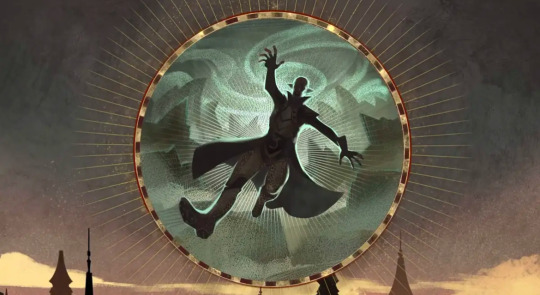
Solas has always walked the line between pride and wisdom: unlike pure spirits, he is able to fluctuate between them - just like Mythal with benevolence and retribution. This makes him more “human” and complex: he even instructs Cole in how being a “demon” and being a “spirit” essentially comes down to a choice we make ourselves.
So Solas is clearly aware of his own failings (just look at his name), but his greatest flaw is not changing in accordance with his own awareness. Due to his wisdom, he knows he is prideful, so he constantly asserts that he is NOT a god: this is as much to make others not worship him as the dread wolf, AND as a mantra to himself to keep him from becoming another Elgar’nan.
However, the limelight is an intoxicating thing, and with him choosing to carry the cross as the dread wolf, he invites that prideful corruption into his heart. It is difficult to truly believe you are not more special than everyone else when everyone else keep telling you how you totally are. As a spirit made man, he is still in danger of becoming what others view him as: he mirrors how you treat him in inquisiton, and he took the name of fen’harel (probably uttered by Elgar’nan) as a badge of pride.
We are told he treats everyone as disposable pawns in order to reach his goals, and we also see the truth of this in his memories. Some people argue that this is out of character for him, since he cares deeply for the elven people and their freedom. I don’t think these things are mutually exclusive: he simply rationalizes everything in order to reach his goal of helping the elves: even if that means sacrificing people
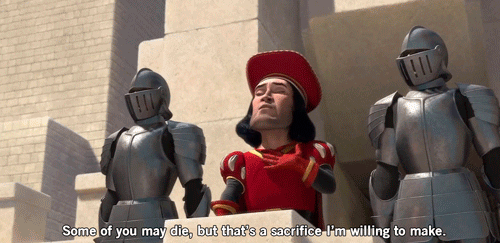
The thing that is so chilling about his character is that he was never meant to lead - he never WANTED to lead either: Mythal was the judge, he her advisor. Without her caring heart to guide his brilliant mind, he becomes callous and makes decisions based only on how best to “win”. This is not to say he does not have a heart, but that he believes he has to set it aside for the greater good: which is exactly where his reasons for leading the rebellion/ tearing down the veil and his methods for doing so contradict each other
He ends up losing sight of his initial reasons because the war makes him so calloused. I believe he shuts down emotionally and can not feel anything but apathy towards everyone when he puts on the mask of the dread wolf - as seen in how he treats the inquisitor vs Rook.
By making so many decisions with such dire consequences and not letting himself feel the weight of that (it would break him) he becomes separated from the “pawns” he uses and stops thinking of them as people. The world becomes a chessboard and a game to him, and that is exactly how a god would think.
That is also the reason he becomes so angry at Rook for saying he views himself as a god: he is so afraid of becoming that conceited, but at this point, the thing keeping him sane and keeping the dam of his pride sealed is the mantra: “I am not a god”. He KNOWS the truth of that mantra, but as this point he doesn’t FEEL it, because he has denied himself to feel anything for anyone in order to be able to get rid of them if logic dictates it.
Through his wisdom he understands why it is detrimental to believe yourself a god, and because of this he is in denial of his own feelings on the matter: he acts like a god, feels like a god, yet knows that he would become what he hates most by acknowledging it - that’s why he uses the mantra: it’s his last effort to stay somewhat grounded.
This brings me to the “I AM A GOD” ending. This is where the dam breaks: he finally allows himself to fully embody his mask; his pride; his demonic side.
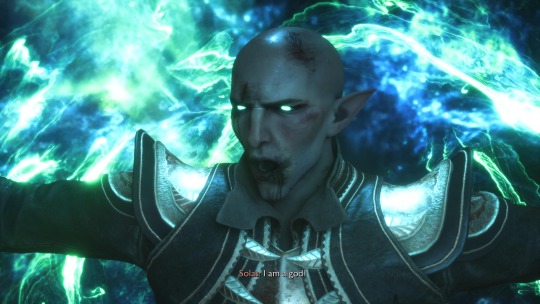
By losing to Rook and co through force he is forced to admit to himself that he sees Rook and the world as inferior - he is the only one who can make it right and they are all children, who do not understand him (they shunned understanding when they used brutish force) because compared to them he is a GOD. He accepts pride and abandons the wisdom of staying grounded with the people - the people abandoned him so he abandons the people. He becomes what he has feared most becoming (it is also interesting that his biggest fear is to be alone - and a god stands alone in their arrogance).
He is truly lost to his demonic aspect in this ending and the dark colours of the ending picture reflect this. It is not difficult to argue this is the most tragic ending.
2: Breaks his pride:
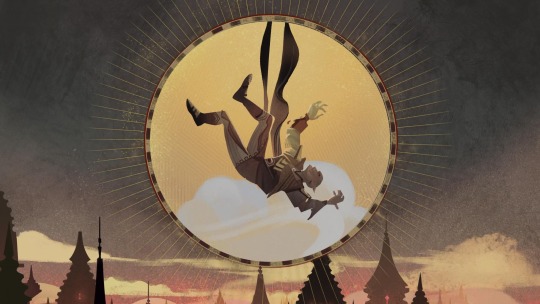
Most schadenfreude ending in terms of outsmarting Fen’harel: proving to the world AND to Solas he is not a god and that he is not immune to be outsmarted by a mortal
It breaks Solas’ ego to be outsmarted, since his cleverness is his pride. It sets him free from his pride as it was the proof he so desperately needed: the people inhabiting this world are capable of being his equal and besting him at his own game. He is not better than them, or better put: his cleverness is not infallible. You could argue that a romanced Lavellan/ friendly inquisitor has already proven to be his equal in terms of wisdom, but then again, he has never truly been their adversary.
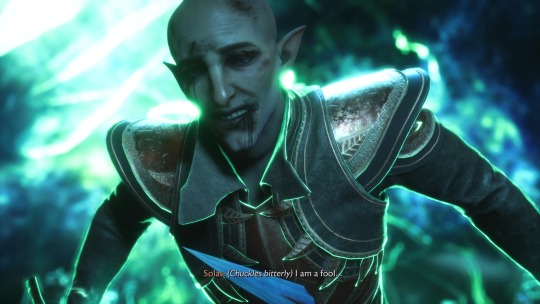
There is a maddening clarity to him when he finally says “and I am a fool”. I find the break of his pride to be heartbreaking: even though we are told it is a demon version of wisdom, we have seen Solas balancing both aspects - and his name also reflects how big a part of him it is. You could argue he becomes less of a person in both the Pride and Wisdom ending, but more demon/spirit. It is a loss of human complexity and he finally returns to the Fade more alike himself before he took on physical form.
Perhaps it can be argued this ending is the best one from Solas’ P.o.V without a romanced Lavellan: after all, she was the only thing that could “steal his attention from the Fade” or in other words: the only reason he would consider willingly taking physical form without being asked to.
3. Breaks his leash:
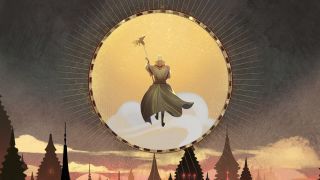
The third one is more complex (so bear with me here), because accepting your mistakes and growing in order to not repeat them requires human complexity. A thing Solas has avoided his entire physical existence. He is stuck in regret, yet would repeat all his mistakes again given the chance.
His avoidance of humanity is best seen in the contradiction of his disregard for lives and his conviction of freedom for the elves. His nature compels him to stand against tyranny and enslavement - to be a champion of freedom of choice and thought. Yet as a leader and a strategist he refuses to acknowledge that people matter in more ways than being pawns. He will grieve them later, yes, but his love for a person will never waver his decision if he deems their sacrifice the best course of action in the war - he will not even ask their consent (as seen with the Disruption spirit in the Fade memories).
He does not acknowledge that people are an intrinsic part of war and their lives matter in that equation. He struggles with his mistakes and the lives lost but he can not stop to think he might be going about it all wrong, because I imagine he fears if he factors in the emotional weight of his choices, it would impede his end goal, or worse: break him into indecision.
The emotional weight of the war and the lives lost, his mistakes and his position as a leader - not an advisor, are so against his spirit nature that he suppresses these issues instead of dealing with them like a person. He becomes prideful because he shuts other options out. His way is the only way.
He sees everything fall apart: everything he does: disaster is sure to follow: The blight, trapping the elven gods, the murder of Mythal (x2) - yet he can not stop. He does not know how. He is desperate for a way out - a way out of regret and feeling the weight of his mistakes - he pushes on because that is his only option lest he truly faces what he has done and the pointlessness of it all. All the lives he has sacrificed need to mean something - that is what he sacrificed them for. How can he face that he killed them and not have an excuse for doing so?
In the last ending he is forced to talk about these things: the Inquisitor tells him he is forgiven if he just stops. Yet this is not enough - he has sacrificed Mythal (and in ways himself) to reach his goal and it can not have been in vain. Here Mythal jumps in and helps him carry the weight of it all by shouldering it beside him. He finally lets himself feel the weight of it all and it breaks his conviction. Mythal releases him from her service: the leash of service to not only Mythal, but to her dreams and visions for the elven people; the very reason he was made manifest in the physical world, and so their very long and increasingly painful relationship comes to an end. He gets closure. He allows himself to grow and so he sets out to undo his mistakes: to sit with them (the blight) and truly do the best he can to heal what can be healed. It is the most difficult ending - a true apology: he has to pull a Bharv.
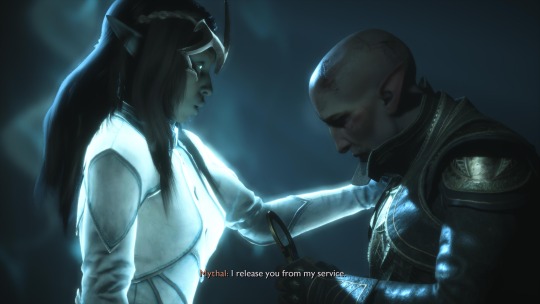
It is also the ending which was foreshadowed if you chose to let Varric help Cole in inquisition. I might get into this more in another post, but essentially he becomes more human by dealing with his shit and growing. It is a warm thought that the best ending is the ending Varric helped make way for.
It wraps up the story nicely as well: he enters the Fade a human, just like he entered the physical world a spirit, underlining the complexity of his character arc.
This is also the only ending in which he can end up with Lavellan: I think it is poetic that she can only join him if he becomes more human, less spirit; a mix of both Wisdom and Pride. He has to accept his humanity and the weight of a human heart - metaphorically, he has to make the choice to finally enter the physical world and all of its complexities of his own volition: and there he finds her waiting.
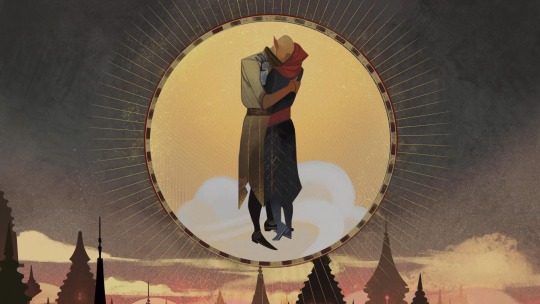
#dragon age veilguard#da: the veilguard#veilguard spoilers#dragon age the veilguard#Veilguard#dragon age#solas#Lavellan#solavellan#Mythal#fen’harel#dread wolf#dragon age theory#dragon age ending#dragon age analysis#elgar’nan#wisdom#pride
555 notes
·
View notes
Text
I've seen people comment on how Spite is more like a loud dog than a demon, that he's underused, and just generally pretty harmless.
But honestly it makes sense he's like that. What's more spiteful than defying everyone's expectations
Contains spoilers
A demon is described as a spirit whose purpose has been perverted, turning them evil
But it's also been stated that there's less of a difference between the two than most realize, both by Solas and Bellara.
Just as a few more examples
In one of Emmerich's banters with Harding, he mentions that more sophisticated spirits vary in kindness, or “There's the curiosity that leads one over a hill, and the curiosity that kindles a house fire”
Spirits also don’t really have to turn into demons to do harm. Take for example Cole/Compassion in Asunder. He kills a ton of people but he never really stops being a spirit of compassion, it's just that he views killing people as compassion.
In “Regrets of the Dreadwolf”, its implied that Solas was a wisdom spirit who became a pride demon, and while your opinion about him can vary, he’s not particularly demonic"
A spirit’s purpose can shift without them turning into a evil or into a demon, as shown when a spirit of Compassion turns into Eulogy after Docktown’s “In Memoriam” quest
It’s mentioned that before becoming Spite, it was a spirit of determination. Lucanis also states that “Any spirit can become a demon, Zara didn't give them a choice”. so I think we can safely assume Zara was the one who turned determination into spite
It's also kinda implied that spirits don't always lose their original purpose when they turn into demons, it just usually shifts to a different aspect of it. Wisdom to Pride, Justice to Vengeance, Determination to Spite.
And spite as a concept really is close to determination, I mean how many times do you hear about people who are determined to succeed solely out of spite.
Who is it that Spite hates most of all? Who is the person Spite wants to Spite the most? Zara
And the thing that Zara wanted most out of Spite is for him to be evil, for him take over Lucanis, to hurt people, ect.
And so when a spirit, created out of the determination to spite a lady who wants it to become evil, is forced into Lucanis’s body, is it really a surprise that it doesn’t go as planned.
I mean Spite can be a jerk, but he mostly just throws temper tantrums when he doesn't get his way, and the worst thing he does is attacking Illario after he kills Zara, which to be honest is kinda deserved.
In fact, he usually seeks to help Lucanis, I mean he fucking drags Rook into Lucanis mind palace to act as a therapist. And afterwards there's a conversation between Emmrich and Lucanis where it's brought up that Spite literally thought they were still in the Ossuary, which is why he kept trying to escape through the Eluvian.
Overall I feel that he’s closer to a spirit of living in spite of trauma. Of succeeding despite others saying that you can’t, and being kind even though the world is cruel.
#Over time I feel that he'd also become more humanlike similar to cole#Spite: Everyone expects me to be evil so i wont be just to fuck with them#da:tv#da: the veilguard#dragon age lucanis#lucanis#lucanis dellamorte#dragon age spite#character analysis#dragon age meta#dragon age the veilguard#spite dragon age#veilguard#lucanis dragon age#veilguard meta#dav#veilguard spoilers#datv spoilers#dragon age spoilers
537 notes
·
View notes
Text


Fangs of Fortune 𓆩𓆪 End Credit Shenanigans
#giffing this gift from the credits as it deserves to be because what is even happening here#show this to someone oblivious and try to convince them this is from a super serious drama#anyways episode 25 has punched me in the guts again and then slapped in the face with this#i think i should start making gifsets of all the end credit scenes you know... for scientific analysis hmmphs#fangs of fortune#zhuo yichen#zhao yuanzhou#li lun#wen xiao#tian jiarui#yan an#hou minghao#chen duling#da meng gui li#大梦归离#mf fof#my:gif#cdrama
347 notes
·
View notes
Text


oh my poor sad little meow meow
#the analysis there will be about this scene later oof#tatort saarbrücken#spatort#adam schürk#HE IS SO HOT WHY#love me a lil damaged man#das ende der nacht
313 notes
·
View notes
Text
Veilguard and the Failures of Surface-Level Liberalism
Strap in pals of all genders and creeds, this is long.
Despite presenting itself as a progressive and inclusive RPG, Dragon Age: Veilguard is not a leftist game. It reflects the superficial politics of contemporary Western liberalism: visually diverse, rhetorically inclusive, but politically hollow. Like the modern Democratic Party in the U.S., it trades radical or transformative ideals for shallow representation, and in doing so, it reveals an underlying conservatism that both limits its storytelling and leads to unintentional ideological harm.
Before we begin, a brief note: a materialist analysis, rooted in Marxist thought, focuses on the concrete, material conditions that shape social life—such as class structure, labor, power relations, and access to resources. It asks who holds power, who produces value, and how inequality is maintained or challenged. In media, this means looking beyond what stories say and analyzing how they reflect or obscure real systems of oppression and change.
It's useful to briefly define neoliberalism. Neoliberalism is an economic and political philosophy that rose to dominance in the late 20th century. It emphasizes deregulated markets, privatization, and individual responsibility over collective solutions. Under neoliberalism, social problems are reinterpreted as personal failures, and political engagement is reduced to consumer choice. In media, neoliberal storytelling often replaces systemic critique with personal empowerment, turning collective oppression into individualized struggle and positioning social justice as a matter of branding or taste rather than structural change.
On its face, Veilguard looks like the product of progressive ideals: you can customize your character's gender presentation, choose from a visibly diverse party lineup, and engage with themes of identity and belonging. But these elements stop at the surface. The game offers no deeper vision of social change, economic transformation, or solidarity.
This mirrors the liberal fixation on identity politics without class analysis. Like the Democratic Party, Veilguard wants applause for "looking inclusive" while sidestepping the harder work of interrogating systems. It does not question who holds power, how that power reproduces itself, or what solidarity across difference might look like in practice. There is no structural critique—only aesthetic gestures. There is no vision of solidarity. It's similar to how the Democrats have been running on a platform of "vote for us or else" for decades, because their politics largely agree with the basic material premises of the other party, that being neoliberalism, and the only thing they have to offer is the "or else".
And, just so you don't brush me off as some chud, I am not American, and I cannot vote in the elections. If I were American, I would vote
Democrat, not third party candidates, for obvious reasons. It's just, from where I stand, the US has a party on the right, and a party on the far right, and leftist options aren't genuinely on the table.
Veilguard has no meaningful conception of class struggle. The party members do not grapple with class dynamics between themselves. There is no collective vision for how to reshape the world. NPCs and factions are individualized; systemic analysis is nowhere to be found.
Compare this to Final Fantasy VII Remake or Disco Elysium, which offer actual political theories, explore the costs of extraction and labor exploitation, and question the player's place in systems of oppression. Veilguard instead takes the safer path: personal identity as the only axis of oppression worth mentioning.
This isn't progressive. It's neoliberalism.
One of the clearest examples of this failure is how Veilguard handles Tevinter. In previous games, Tevinter was known for brutal class hierarchies, magical oligarchy, and chattel slavery. This should have been fertile ground for a materialist critique: a fantasy setting where the costs of empire, elite rule, and oppression could be examined.
Instead, Veilguard sanitizes Tevinter. The anti-slavery detective Neve is stripped of her struggle's stakes, because slavery is nearly invisible. Her political engagement becomes personal branding. Her character reads like a consultant's PowerPoint slide on "gritty female rep," not a fighter in a living system of exploitation.

While Tevinter should be the perfect setting to interrogate labor, class, and entrenched hierarchies, Veilguard flattens the issue of slavery into a stylized backdrop. One of the most politically loaded questions—how to dismantle slavery—is presented as a choice between two NPCs: the moderate reformer Maevaris Tilani, and the more radical Dorian Pavus. If the player saves Minrathous, they can choose between Dorian's immediate upheaval at the cost of stability, or Maevaris's slow institutional reform, which keeps Tevinter structurally weaker but more diplomatically stable. If Minrathous is not saved, Dorian simply becomes Archon by default. Mechanically, this choice only affects the ending credits and a few party member reactions, not that party member opinions actually come with consequences like in DAO or DA2.
This choice is not interrogated. It becomes a matter of player flavor, not political vision. It reduces the end of slavery—a deeply systemic issue that could have spanned quests, moral tension, and class engagement—to a question of who should be the next enlightened ruler, as though the system will simply fix itself with the right person in charge.

It's a Superman fantasy dressed in moral earnestness.
Let's have a few examples of how the lack of thinking hampers the narrative and messages of the game.
The same lack of structural thinking undermines Taash’s storyline as well. Taash is a character navigating a nonbinary identity in a supposedly transphobic and sexist society—but Veilguard never convincingly builds that society. Every major character except Shathann affirms Taash's identity without question. The arc is framed around whether the working immigrant mom will use the correct pronouns, which might be emotionally resonant if Veilguard actually depicted transphobia or gender norms in a systemic way. It doesn’t.
The setting’s supposed prejudices are surface-level inventions with no institutional or cultural weight. The Chantry is matriarchal. Women serve in every political and martial role, and conversely, men in the setting have been portrayed as caretakers, mages, academics, or healers. Transition is possible, and even accepted in Qunari society. Unlike Dorian's story—where his father's attempt to use literal blood magic to "fix" his son's sexuality comes with real stakes, taboos, and danger, or Maevaris's story of coming out and starting to live as a trans woman, to great scandal in the aristocratic society of Tevinter—Taash’s conflict lacks material consequences.
The result is that Taash’s arc feels both emotionally weightless and politically incoherent both inside the world and at a meta level. Remember, Veilguard presents a cast full of women, but often does not treat them as full people. Maternal characters are punished. And only women are expected to perfom allyship and be sexually available, whereas the male characters are exempted from caretaking beyond having quirky pets. And so on.
And while the choice between Dorian and Maevaris makes sense on a story level and I like both characters, it just underlines the lack of critical lenses in the editing room that the end result is that the new top leadership for Tevinter will always be the AMAB scion of an aristocratic family.
It's such a missed opportunity honestly, I would have loved to see a Calpernia-as-the-wildcard-newcomer-from-the-working-classes and Maevaris-as-the-aristocratic-mentor-behind-the-scenes girlboss teamup.
The treatment of the Dalish elves provides yet another example of how Veilguard lacks the empathy and complexity needed to write real diversity. Despite being a displaced diaspora with a long, storied spiritual tradition, the Dalish as a group suddenly and near-unanimously turn away from their gods once it's revealed that those gods were corrupted or false. None of them seriously grapple with the emotional or cultural weight of this loss. There is no spectrum of belief. No internal conflict. Even Bellara's brother is portrayed as mind-manipulated and corrupted by evil forces and then killed off, conveniently removing any need to engage with his ideological position.
In real-world diasporas and cultural groups, the opposite is true. Disagreement and ideological diversity are the norm. Cultural traditions, even those with flaws or dark histories, remain emotionally potent and hotly debated. Some members cling harder to old beliefs in times of crisis; others reform or reinterpret. But Veilguard sidesteps this entirely. It reduces a displaced people to a monoculture with a conveniently aligned opinion.
Based on the content in Veilguard, I am fairly sure the authors would describe themselves as feminists, and would, if asked, reject sexism or inequality between men and women, classism, racism, and so on. This failure I'm describing doesn't happen because of agreeing with the wrong ideology or support for a party or whatever.
The ultimate problem is that Veilguard is trapped inside a specific liberal worldview: one that fears complexity, refuses solidarity, and replaces structural critique with PR-friendly inclusion. It treats oppression as a set of aesthetic signifiers rather than a system. It treats politics as something that happens through identity choices, not collective action or transformation.
Really, beneath its inclusive surface, Veilguard treats its core cast not as members of a collective, but as exceptional individuals who matter more than the world around them.
In this way, the game echoes Ayn Rand's ideology: the exceptional few are the only ones worth saving, empathizing with, or narratively prioritizing.

This explains how characters like Emmrich and Harding can plan a whimsical picnic trip to the Blighted South with zero social consequence. The world is dying, half the continent has been consumed by a magical cataclysm, yet somehow the party has access to luxury food items like expensive coffee beans. There is no material scarcity or logistical tension. This also explains why the player is never allowed to tell Taash to set aside the identity struggles until after the apocalyptic threat is dealt with—because in Veilguard, individual emotional arcs matter more than shared survival. The elite chosen few still deserve their personal resolutions, no matter what collapses around them.
Nowhere is this clearer than in the Minrathous vs. Treviso decision. Mechanically, the choice has no meaningful effect on the larger world. Minrathous is doomed either way. Treviso's destruction matters only in terms of whether the male romance option, Lucanis, will date the player or not. The female option, Neve, of course, remains romantically available no matter what.
The stakes are not moral, structural, or material. They're personal and transactional.
The Blight can spread, cities can fall, but your companions still host book clubs and have access to fresh fruit. This isn't solidarity. It's elite individualism dressed in inclusive costume.
Veilguard may look inclusive, but it’s deeply status-quo. Its treatment of women, its sanitized view of systemic oppression, its Randian elevation of the elite cast over the world, and its absence of class consciousness are not just narrative flaws—they’re ideological ones. The game mirrors a liberal worldview that wants to feel like progress without doing the hard work of justice—one that smugly assumes its values are universally shared, regardless of players’ and characters' backgrounds, cultures, or material realities. As a result, it doesn't meaningfully explore what building real solidarity or inclusive political futures might require.
If we want better games—and better futures—we need to move beyond representation as window dressing. We need stories that see power, challenge structure, and believe in something greater than optics.
And we need games that don’t just let women, or black people, or sexual minorities exist.
We need games that ask why the world tries to erase them in the first place.
#veilguard critical#dragon age the veilguard#bioware critical#veilguard spoilers#da:tv critical#dragon age critical#a lot of thoughts on veilguard#da: the veilguard#dragon age#datv#media analysis#political analysis about video games
172 notes
·
View notes
Text
the significance of rook as a protagonist who is 'unable to be evil' is because the inquisitor can be. and hawke. and the warden, for that matter. in dai there are companion disapproval cutscenes for a reason: you have either fucked up so badly or killed so many people that they literally stage an intervention for you. rook, by contrast, is a tremendously appropriate protagonist for veilguard—not just because they’re handpicked by varric but because they are good. like their goodness is the point. it is the story.
and i get why some players would be upset by that and feel constrained by the moral paradigm the narrative inherently embodies. players like options. however, rook's goodness (in whatever capacity) does not necessitate that they're a bad/flat protagonist considering they have unique backstories which tells us about the quality and the context of that goodness. in my opinion, it's a natural byproduct of the overarching story of the dragon age games: yet another person thrust into a role and political position they did not ask for but must pursue for the greater purpose of all.
the thing about veilguard though is that no possible protagonist could be as bad or as evil as the evanuris (and by extension, the chaos ripping the veil down would do at this point in time), so to play as an evil!rook feels counterintuitive to the point of the game regardless.
if we WERE to get the option to play an evil!rook who, for example, supports the evanuris and blights the world alongside them, it just means there's no more world to play in. dragon age is over.
furthermore, there's no option to help solas bring the veil down because it is an evil option. it's not a dev mistake that rook doesn't get the opportunity to side with our favorite war criminal. to most thedosians, the end of the veil means the end of their life. solas is one of the most unreliable narrators in the series, so the idea that he has harm reduction measures in place is unmeasurable because he is a proven trickster. those who'd take the chance anyway would still be considered evil by all who are affected in the wake of it.
—and i agree that it would be fun! but it's not veilguard's story because the stakes are higher than they have ever been in previous games, and thedas needs someone else to save it once again.
#dragon age#veilguard#rook#datv#yet another braindump so obv not a thorough or comprehensive analysis#veilguard positive#dragon age the veilguard#just A Singular Thought okkkkk#da#mine#and listen i get it. i too wish we could have another quest like in hushed whispers but the thing is.... we HAVE hushed whispers#like we've SEEN it and that was just by corypheus' hand#imagine if solas had won? WHOOOWEEEEE#yeah yeah i know this argument has been beaten to death but i haven't dumped my thoughts out about it yet so here i am#screaming into the void. thank god for this website bc where else would i do this#meta analysis
351 notes
·
View notes
Text
Neve Gallus - Character Design Analysis
Neve knows how an outfit builds character, whether it's to project a genuine or false perception of the wearer. All her clothes are designed to convey "wealthy and powerful mage" as a safeguard. In this analysis, we'll take a look at Neve's Dragon Coat and point out details, symbolism, and intention with design—all under the cut.

Asymmetry
The first aspect to cover is the asymmetry in Neve's overall design. Not pictured, her bun is uncentered. Pictured, her coat is raised higher above the left thigh, and her hat sits at an angle while the veil creates a dividing line across her face. Her bangs act like a veil of their own as well.
Asymmetry in a character suggests they're dynamic, unconventional, nonconformist in some capacity, willing to behave outside of the box, etc. You can see that reflected through Neve's willingness to work with the Threads, to skip ritual protocol (re: her conversation with Emmerich), her work-life imbalance, and how she's open and teasing with the companions despite her archetype. You'd expect a jaded and cynical detective to be more gritty and detached, but Neve is soft and engaging once she's beyond her initial assessment of each companion.
Returning to the coat's left side: I would guess the raised adjustment's purpose is visual compensation, to bring attention away from her prosthetic. It's easy to notice the length difference with a still, but when she's walking and in motion, it's not something you pay attention to. The devs mentioned they wanted her prosthetic to be treated like an average part of her, and they succeeded.
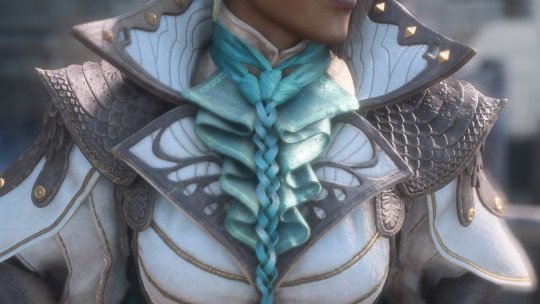
Thematic Imagery
The major imagery shown above is a butterfly. Butterflies represent metamorphosis. Change. And that's exactly what Neve endeavors to enact for Dock Town. Her scarf's knots create the head, around her neck are the antennae, and the braided tails form the body. Her collar and lapels shape the wings, while the curving leather and embroidered gold are reminiscent of a monarch's pattern.
The secondary major image are the wings, created from her shoulder pads with unfurled feathers beneath them. Wings typically represent freedom. In Neve’s case, this freedom relates to her city.
Combined, the butterfly and wing visuals symbolize transformation taking flight and paving a course for a better Dock Town.
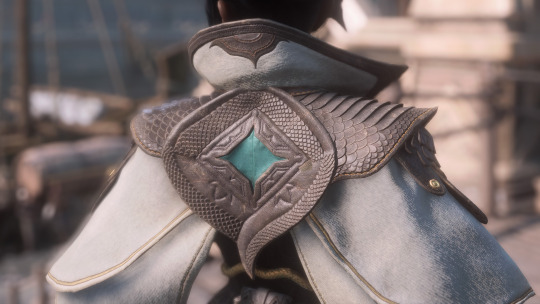
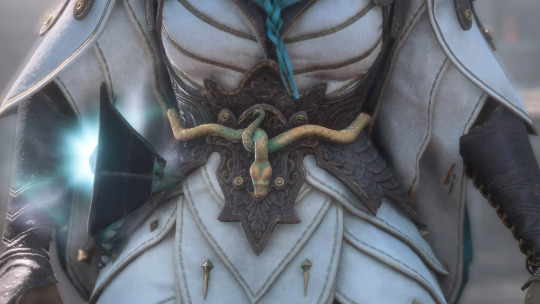
Tevinter Symbols
Recurring motifs include snakes (belt, cobra prosthetic, scaled earring) and diamonds, both symbols heavily used by the Tevinter Imperium. They serve as provocative and centering design elements at face value.
The diamond adorning her back reminds me of a coiled snake; the end curl would be a tapering tail. Scales are embossed in the leather for a tasteful touch. Or maybe the shape represents a dragon, because the crowns adjacent from the diamond look like feet? It is called the Dragon Coat, so maybe it's a dragon's butt.
I've debated about whether the tiny, gold diamonds with tails are of significance, but they could very well be simple elements to break up monotony. Theories on what they could represent include the Wall of Light, architecture, fangs, or scales. Perhaps they're pins for case notes? Girl is on point and also kind of a disaster. I can imagine her pinning random notes and categorizing them by what layer they're pinned to.
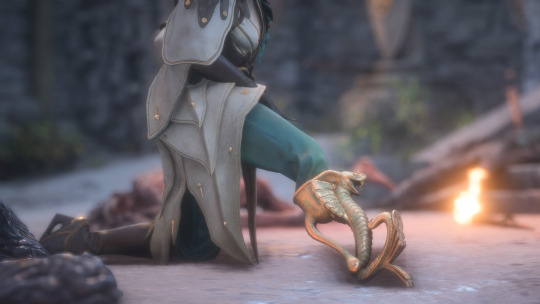
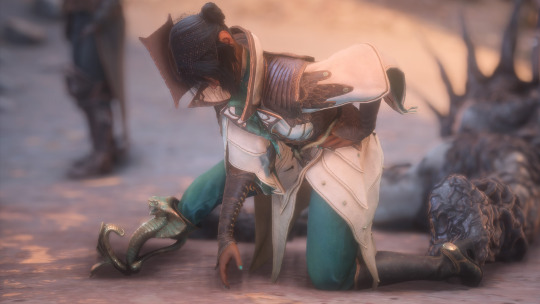
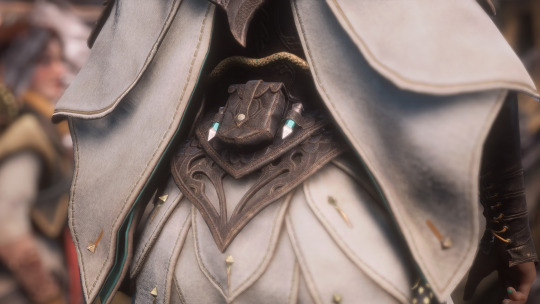
Utility
Neve has options to choose from when it comes to keeping detective gear on her person, which shows her practicality. It pays to look good, and it pays even more to have fashion be useful.
The Dragon Coat's description itself mentions many pockets to stash case notes. The pockets are likely on the inside of her sleeves. Attached to her waist is a compact pouch with two objects slotted into the adjacent holders (could be writing utensils).
Again, if those diamond tears are pins... you can see the potential for stashing even more notes.
Neve's cobra prosthetic is part of every outfit, but I wanted to showcase its degree of function under utility. The ankle was designed as a hinge. This gives her improved mobility, which of course includes stretching. It most likely becomes uncomfortable after long durations of use; you can often see her weight shifted to her left leg and checking on her right leg. The entire prosthetic design is on point, and the extra attention to detail is exquisite.
Color
Turqoise.* In every companion outfit available, there is turqoise. I would say she "just likes turqoise," but that doesn't align with how she searches for deeper meaning in the subtle things. So for analysis' sake.... The color itself compliments Neve's playfulness and creates contrast to Dock Town's more or less neutral palette. It's a fun, vibrant color that makes a statement. It's also shared by the Shadow Dragons.
While Neve can be intimidating and is a badass, she's light and idealistic at heart—if you dig deep enough. All cynics at one point held hope in high esteem, before they were proven wrong one too many times, or maybe in one heinous letdown.
(*As a disclaimer, the color may not actually be turqoise. The symbolism as a vibrant and saturated color stays the same though, whatever the case.)
And… that brings us to the end of examining Neve’s Dragon Coat and what it shows us about her character. Any other thoughts, please share!
182 notes
·
View notes
Text
So I stitched together the rotating camera shot from episode 7 of Dandadan. Youuuuuu might have to zoom in a bit though.

This sequence was almost completely anime-original, and it's a great example of why this episode took the show to a whole new level and made me sob into my iced cream.

In no small part, thanks to Shuuto Enemoto (榎本柊斗) who was animation director, and for the first time (?!) did storyboards for this episode. Which is insane because, well, see above.
The manga only spends about 2 pages with the little girl, the anime really basks in this montage of beautifully mundane moments for a full two and a half minutes.



Dandadan is at its best when it's drawing from cinematic influences and thinking about how a real camera could be used to tell its story. The simulated camera rotates slowly around the small apartment and tells the story of this girl and her mother's life together through simple, but touching scenes. This technique isn't as common as the dolly-zooms they've used a few times, but it reminded me of this sequence from "Hunt for the Wilderpeople" (2016) that makes brilliant use of its rotating camera and some cleverly placed body doubles to show the passage of time and development of the relationship between its two protagonists as they're hunted for weeks through the forests of New Zealand. (there was also a really cool and expertly choreographed one in the Showtime series "Kidding")

And it all culminates in this cut where we rotate around a birthday cake and the warm glow from the candles brighten both of their faces. The enchanting, gliding camera movement puts us on the girl's level, and makes the cake look huge and wondrous.

This type of sequence may not be technically difficult in the same ways as it is in live action (though I'm sure it does pose its own technical challenges in animation) but it' shows it's just such a brilliant way to portray this story.
And that's just one of many bits that took this episode above and beyond! I go into way more detail on the animation in this video. Go watch it.
youtube
(two videos in a week, who am I, XQC?)
#dandadan#dan da dan#anime#animation#animation analysis#vudei#mini essay#video#media analysis#gif#Youtube
228 notes
·
View notes
Text

Yesyesyes because someone interrupted the last time she tried 🤝🤝🤝
#dan da dan#okarun#momokarun#momo ayase#dandadan analysis#dandadan fandom#dandadan manga#manga#anime and manga#anime art
201 notes
·
View notes
Text
One thing that I find incredibly interesting about Arthur Lester as a character is how he deals with interpersonal conflict.
We've known for a great while now that Arthur is a man incredibly prone to violence. If it's something he can fight physically, if violence is an acceptable answer, he is all in. Tooth and nail, snarling, thumbs dug into soft, yielding eye sockets or leaking open wounds. He is vicious and he is angry and he is wholly determined to survive, ready and willing to take the other party down with him if necessary, if object of his wrath is an enemy, something in his way, something he feels he has earned the right to destroy. The Widow, Kellin, Faust, Larson and his sons, Aldrich Ward, Antoine—near the end when secrets and patience came unraveled—and even William, that childhood friend he'd once cared for so much, they all fell prey to that violence. He and the Butcher are the same in that way: vicious snarling animals.
But if it is a situation that does not call for violence, that cannot be solved by burnt bridges and bloody knuckles, he is avoidant. Incredibly so.
His first instinct when fear took hold and told him that he needed to leave Bella, his wife, wasn't to talk to her, to discuss it like adults. His first instinct was to skip town without a word, without a confrontation, without a fight, like a shadow. He couldn't fight her physically, not that he ever would have. She wasn't something he could intimidate away and he didn't want her to come to harm. He didn't want that confrontation. Even in death, he avoids her. He doesn't attend her funeral.
He acts much the same with Daniel. When they arrive at his doorstep, Arthur pauses, hesitates, tries to turn tail and run from a man he cannot fight because he needs something from him, but John holds him steady and he stays. He talks. He comes out better for it. But he wouldn't have done it without John's help. He would have run.
And again with Oscar, and his proffered purpose. Arthur rejects it, with everything he is and has and believes, but he needs Oscar still. He cannot push him away, because of the stone that still sits in his pocket like a lead weight and threatens to pull him under. (Further still, he will avoid the letter Oscar writes to him, and will not read it until he is certain he is about to die, knowing then that there is no after, and there is no where else to run. And even then, he has waited too long.)
And later still, when John's fears bubble over, when Arthur acknowledges, fully, that John is lying to him, that avoidance drives him. "I don't want to...because of what you may say." He did not want that confrontation with John. He did not want that fight. Why this, out of every other argument they've had, of every other harshly spoken word, why was this the one that Arthur shied from? Why was this the fight that scared him? He's not afraid of conflict with John, we know this, they've done it a thousand times before.
Arthur's shell is thick and armored, steeled against innumerable physical dangers and threats, pain that he can shake off and bounce back from time and time again, but it is the emotions that wound him deepest. Internal lacerations caused not by blades, but words. It is the revelation of knowledge that he cannot fight or run from, of learning that the piece of driftwood he clings to isn't really there at all, or that its truly a cinder-block tied to his ankle, weighing him down. In terms of people he cares about, of people he loves, he would rather torture himself with a thousand possibilities of things
And we learn, from Parker, in the last of the words that he ever spoke, that Arthur always does this. Always pushes the ball down the road. Always avoids what can be confronted today. Always flees when maybe, the better thing to do is to stay.
#he makes me insane#ive genuinely had this analysis in the bank for MONTHS and then Da Capo came out and i stood up and did a big ass fist pump#like “excellent! i got a good grade in arthur analysis which is something normal to want and possible to achieve!”#malevolent#malevolent podcast#arthur lester
122 notes
·
View notes
Text
Laurent & Jealousy
While I see the merit and appeal of jealous Laurent, it's also notable how unpetty he is at times. Like when telling Jokaste he didn't think she DID choose between brothers, knowing she still had feelings for Damen. He's figured her out, robbing her of her ability to continue playing the game, but he doesn't lord it over her. Which might sting worse, idk, but I woulda been hella petty and he's just not.
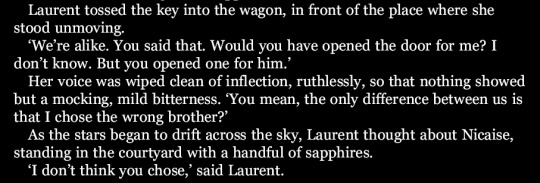
He's not even magnanimous in victory; he's compassionate toward someone who knew well how wonderful Damen was and willingly let him go. He's secure in the knowledge of who he is and what he possesses, and he's like that with Nicaise too (who of course was never actually at his throat). He has an affinity for other people who are sharp and calculating with some inner goodness to them, especially when they can dispense with the illusion that there's any real competition between them.
I think his amateur domming via Ancel and the nice brothel ladies reflects this surprising lack of conventional jealousy too. He does it because he can't touch Damen himself but wants to work him out sexually, figure out what he likes, and exercise control over him in that realm, since he knows Damen's attracted to him. And he is attracted to Damen, too, but he's conflicted over it, and this way he can channel his desires safely (since he has only known sex to be violent, used to hurt and control) while still making a power play. There is never any uncertainty—not on his part, not on Ancel's part, and certainly not on Damen's part—that this is about anything but him and Damen. The others are just set dressing, tools.
I often enjoy portrayals of him as jealous and he's certainly.. possessive, in his way. Making it clear when precisely he has begun bending over for Damen as it were, and those repeated instances of him in pet disguise saying he doesn't like sharing...
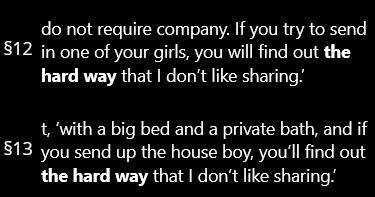
look i understand this line had strategic significance i.e. Do not send anyone in while i'm doing my schemes, but the repetition makes me think there's some truth to it. or else he just thought this was a real banger line that bore repeating word for word
It's just something I've noticed, those instances when he is kind where a more insecure and jealous person could not be. Some of it is a matter of his intellect and emotional control, and of knowing his own limitations. He is not someone who can easily indulge in intimacy, nor does he seem to think it's something he deserves. After coming to know him better and develop some respect and admiration for him on top of his immediate attraction, Damen treats him like someone who does deserve it. In disguise as a pet, and while trading intimate gestures with Damen like icing his bruise or receiving a massage, Laurent indulges in the fantasy that he could be loved. But the reason he likes his vicarious games and does not grow jealous over the Vaskian tribeswomen etc., is not merely the result of his massive intellect and self-possession, but rather from internalizing the 'lessons' of his abuse as well.
The next two paragraphs will concern the Regent and his abuse of Laurent and others so please skip them if that's triggering or if you're just not interested in reading that. I've seen some insinuation that Laurent is jealous of the other boys/young men who are or have been targeted by his uncle, and I'm sure what he feels about his uncle and his other victims is complex. In my view, though, the brutal dressing down of Aimeric was more a manifestation of his own self-loathing, for having once been able to believe that his uncle loved him even as he abused him. He's fond of Nicaise, seeing him as the only boy with the potential to think his way out of his situation, to outsmart the Regent. The fact that he couldn't is devastating to Laurent (as it suggests Laurent won't be able to either), but he also feels a terrible responsibility for having left him there without fully breaking the Regent's hold on him, because he was just a child.
I don't believe he blames anyone else for what a monster his uncle is. Aimeric is around his age, and the thought of still holding those feelings probably repulses Laurent. Yet he can still see himself in Aimeric, because even after everything his uncle has done, he was still surprised to find out that he really did want to end Laurent's life. I think as a result of the abuse he endured and still endures, he doesn't really see himself as a person, someone who could love and be loved. He understands the power of a tease, of wanting the unattainable. He knows the hold he has over Damen but feels in some way that it's false, that if Damen really knew what was done to him, what he 'allowed' to happen, he wouldn't want him. He considers the incestuous "taint" in the family to extend NOT to Auguste, and so implicitly it does extend to him in his mind. He likely internalized that he 'seduced' his uncle simply because he did not want to be left alone as a preteen after his whole family was wiped out.
Of course, Damen's immediate response to learning that Laurent's uncle abused him is utter rage towards the Regent with absolutely no negative impact on his feelings of adoration and love for Laurent, because he is good in ways that Laurent can never anticipate. My underlying thesis, then, is that Laurent's relative lack of jealousy is the result of knowing his strengths but also vastly overestimating his "flaws", which in fact were horrors inflicted upon him as a boy that he's been dealing with on his own ever since, needlessly blaming himself for, bearing the burden alone. Laurent is a whole wriggling mass of trust and control issues. I can easily imagine that he might become jealous once he actually has someone he loves and feels safe with, but Damen's possessiveness seems to give him a giddy thrill; he savors it, perhaps because it seems so unlikely. I think Laurent's own somewhat unconventionally expressed jealousy/possessiveness is the result of overwhelming attraction the likes of which he's never felt before. Or, as this amazing post put it:
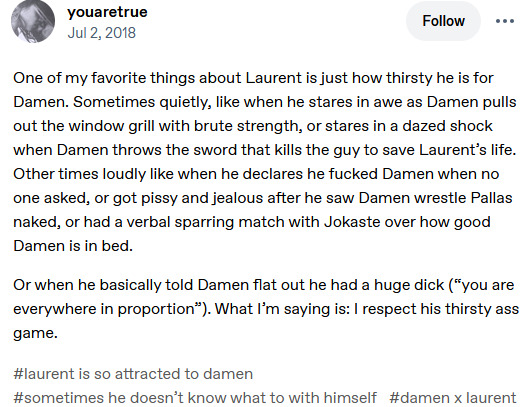
This is just all so new to him—feeling loved and desirable, and loving and desiring in return—and he's clear in "The Summer Palace" that the thing that was developing between him and Damen scared the hell out of him and still sometimes does.
Anyway, this was in my drafts but I banged it out for nice twt mutual @/WakahisaSachiko who asked my thoughts on jelly/possessive Laurent because I had had some thoughts about Damen's jealousy/possessiveness being more conventional than Laurent's. This is now very long so I will see myself out now but please feel free to share your jealous Lamen thoughts with me... I love them so :3
#really do like reading jelly laurent these are just some observations on how i see him in the books#namely the instances where he's gracious when a more conventionally jealous person could not be#some of it is his intellect and self-control but i think he also doesn't get jealous easily because he's not like other ppl in his mind#sounding the most actually jealous with jokaste i think is a reflection of her being comparably intelligent/strategic#and of her currently holding something over Damen and by extension him re: da baby#they are different though#she was in a difficult situation ofc but he's made it abundantly clear he would give his life for damen's#and i think jokaste has too strong a self-preservation instinct for that#capri#character analysis#laurent of vere#damen of akielos#captive prince#lamen
67 notes
·
View notes
Text
Leo Hölzer: Teamleiter, Großer Bruder, Kümmerer und Beschützer
Ich habe hier letztens einen Post gesehen (den ich auf die Schnelle gerade nicht wiederfinde), in dem bestätigt wurde, dass Leo der Bruder von drei kleinen Schwestern ist. Das hat mich irgendwie nicht mehr losgelassen und dazu gebracht, einige Handlungen und Verhaltensweisen unter dem Aspekt neu zu betrachten und Leo noch mal mit anderen Augen zu sehen. Dabei rausgekommen ist etwas, das in Richtung einer Charakteranalyse geht und viel zu lang geworden ist, aber vielleicht findet das ja jemand genau so spannend und interessant wie ich.
Was wir vorher schon wussten und in diesem Tatort noch mehr hervorgehoben wurde: Leo ist ein absoluter Kümmerer. Er merkt, wenn es jemandem nicht gut geht und möchte gerne helfen. Das haben wir gesehen, als er sich um Pia Sorgen macht und sie bittet, etwas zu essen und sich hinterher sogar noch bei Esther nach ihr erkundigt, weil er merkt, dass etwas faul ist. Das haben wir gesehen, als Esther ihm sagt, dass sie bald durchdreht und Leo sie tröstend in den Arm nimmt, obwohl sie ihm vorher an den Kopf gedonnert hat, dass sie ihn hasst. Und bei Adam haben wir das sowieso schon so oft gesehen, in diesem Film, als Adam sich im Imbiss fesseln musste und Leos erste Frage ist, ob es ihm gut geht und er ihm danach direkt versichert, dass es nicht seine Schuld ist. Und ich glaube durchaus, dass das einfach eine Kernqualität von ihm ist. Aber vielleicht rührt das außerdem noch aus den Umständen, unter denen er aufgewachsen ist?
Leo hat nicht nur eine, nicht zwei, sondern drei(!!!) kleine(!!!) Schwestern. Wir wissen noch nichts über Leos Eltern, aber sie sind dann wohl eine Familie mit vier Kindern. Kinder sind teuer und es muss zwar nicht so sein, aber es kann durchaus sein, dass sie nicht viel Geld hatten und Leos Eltern viel arbeiten mussten und dadurch vielleicht auch weniger Zeit für ihre einzelnen Kinder hatten. Ich kann mir vorstellen, dass Leo da sehr früh erwachsen werden musste. Dass er, als großer Bruder, der Älteste, sehr früh angefangen hat, sich um seine Schwestern zu kümmern. Auf sie aufzupassen, sie zu beschützen. Dass er gelernt hat, Verantwortung zu übernehmen, immer der Vernünftige sein musste. Dass er schon da angefangen hat, immer für andere da zu sein. In der Szene mit Moritz Leimers jüngeren Geschwistern verrät seine kleine Schwester, dass Moritz versprochen hat, wiederzukommen. Leo entgegnet daraufhin sehr versichernd „Ganz bestimmt.“ Aus der Perspektive betrachtet, dass Leo selber drei kleine Schwestern hat, um die er sich eventuell auch sehr kümmern musste, kann sich Leo vielleicht gut in Moritz einfühlen. Moritz, dessen Eltern weg sind, der sehr jung und ganz alleine für zwei Kinder verantwortlich ist. Und möglicherweise kommt dieses „ganz bestimmt“ aus Leos eigener Erfahrung, weil er selber auch immer zu seinen Schwestern zurückgekommen wäre. Zu Leos Eltern, dem Familiengefüge und seiner Kindheit wissen wir aktuell nur sehr wenig, fast gar nichts. Der Spatort nutzt aber nicht zum ersten Mal Parallelen zwischen den Hintergrundgeschichten der Kommissar*innen und den Charakteren des jeweiligen Falls als Stilmittel. Außerdem ist Moritz Leimer, der erst wie ein Nebencharakter schien, sogar ein wiederkehrender Charakter und da finde ich den Gedanken gar nicht so abwegig, dass es vielleicht, ganz eventuell, möglicherweise eine Spiegelung oder Parallele zu Leo gibt?
Naja, weiter im Text. Zwischen Geschwistern kommt es auch öfter mal zu Konflikten, Streitereien und für mich würde das sehr in sein Bild passen, dass er oft die vermittelnde Rolle eingenommen hat. Wie auch später in seinem Team mit Pia, Esther und Adam. Dort ist Leo ständig am Justieren von Konflikten, für Esther ist er zu locker, für Adam zu strikt, er kann es niemandem so richtig recht machen, am allerwenigsten wahrscheinlich sich selbst, aber er versucht es ganz verzweifelt. Ich hab es jetzt schon öfter gelesen und nehme es selber so wahr, dass er wie der Kleber im Team fungiert und alles und alle irgendwie versucht zusammenzuhalten. Und damit ist er zwar ihr Teamleiter, vielleicht fällt er dort aber gleichzeitig ein bisschen in seine Rolle als großer Bruder. Womöglich ist Leo es dadurch auch gewohnt, öfter mal der Buhmann für irgendjemanden zu sein.
Mit drei Geschwistern ist es bestimmt auch oft laut gewesen, besonders, wenn sie wirklich nicht viel Geld hatten und vielleicht in einer eher kleinen Wohnung gelebt haben. Ich stelle es mir schwer vor, da einen Rückzugsort zu finden und er hatte ja vermutlich keine Freunde, zu denen er hätte gehen können. Da passt es einfach so wunderbar, dass er dieses Baumhaus - einen Raum ganz für sich alleine, ruhig und im Wald - hatte. Denn ich empfinde Leo als einen ruheliebenden Charakter, der dort vielleicht ebenfalls eine Auszeit von der Rolle des großen Bruders gefunden hat. Einen Ort, den er irgendwann mit Adam teilt. Einen Ort, von dem aus Leo aber irgendwann mitbekommt, wie Adam von seinem Vater gequält wird. Leo, der sich Jahre später noch schuldig fühlt, dass er jahrelang zugeschaut hat, wie Adam misshandelt wird. Leo, der vielleicht von klein auf gelernt hat, für die Menschen, die er liebt, Verantwortung zu übernehmen, sie zu beschützen. Leo, der es nicht mehr aushält, dass sich niemand für Adam verantwortlich fühlt und niemand etwas tut und der es selber nicht mehr aushält, nichts zu tun… Der Adams Vater mit dem Spaten ins Koma schlägt und sich die Verantwortung und Schuld für diese Tat auf seine Schultern lädt. Und der sich selber immer wieder mit dieser Verantwortung und Schuld konfrontiert, indem er Roland im Krankenhaus besucht.
Leo ist außerdem sehr sensibel. Er bezeichnet sich in „Das fleißige Lieschen“ selber etwas zynisch als „Knicker“ und „Weicher“ in dem Gespräch mit Weißer und ich kann mir generell vorstellen, dass, auch wenn das auf Stereotypen basiert (aber diese Stereotypen existieren nun mal in unserer Gesellschaft), die Kindheit mit seinen Schwestern ihn auch dahingehend geprägt hat. Dass er mehr gelernt hat, einen Zugang zu seinen Gefühlen zu haben, sie zuzulassen und zu zeigen, wie zum Beispiel das offene Geständnis, das er an Adam macht: „Ich würde mit dir bis ans Ende der Welt gehen“, eben weil er von so vielen Frauen umgeben war und vielleicht nie auf eine toxische, „männliche“ Art und Weise stark sein musste. Anders als Adam das von seinem Vater lernen sollte. Leo musste dafür aber vielleicht auf eine andere toxische Art und Weise stark sein. Wen hatte er denn zum Reden, bis er sich mit Adam angefreundet hat? Und wen hatte er, als und nachdem Adam gegangen ist? Als großer Bruder wird er sich wahrscheinlich nicht seinen kleinen Schwestern anvertraut haben und gerade bei der Sache nach dem Spaten hatte er ja ziemlich sicher vor rechtlichen Konsequenzen Angst. Er hat also die Sache mit Adam (und vielleicht auch noch andere Sachen? Das Mobbing?) in sich reingefressen, was in dem Gespräch mit Caro raus klingt. Sie bittet ihn, darüber zu reden, was damals los war und Leo leugnet sogar erst, dass überhaupt etwas los gewesen sein soll. Dabei kann Leo Dinge nicht so gut wegdrücken (wie Adam). Darüber reden konnte er aber anscheinend auch nie und hat somit ebenfalls nie so richtig gelernt, seine Gefühle vernünftig zu kommunizieren. Das wirkt sich auch in seiner Kommunikation mit Adam negativ aus. Er versucht es immer wieder, scheitert aber oft daran, dass er am Ende doch zu viel hinnimmt und lieber nichts sagt oder sich abfindet, selbst wenn es ihm gegen den Strich geht.
Und vielleicht ist auch der Grund, warum er in Saarbrücken geblieben ist, der, dass er dort gebraucht wurde. Von seinen Eltern, von seinen Schwestern. Als großer Bruder. Vielleicht hatte er nie die Möglichkeit, einfach so abzuhauen, wie Adam es getan hat. Und das ist eine reine Mutmaßung von mir, die auf nichts Weiterem als meinen ausschweifenden Gedanken basiert, aber vielleicht wusste Adam genau das auch? Dass Leo niemals aus Saarbrücken weggekonnt hätte, Adam selber aber ganz dringend da weg musste. Vielleicht hätte er es dann nicht geschafft zu gehen, wenn er Leo davon erzählt hätte oder (was ich fast noch typischer für Adam und fast schon realistisch fände) er wusste, in was für einen Konflikt Leo das stürzen würde, wenn er ihm sagt, dass er geht und hat für sich beschlossen, dass es besser ist, wenn er ihm das erspart. Leo versucht schließlich immer für andere da zu sein. Ich denke, deswegen tut es ihm später dann unter anderem auch so weh, wie Adam ihn wieder ausschließt und ihm Dinge verheimlicht, eben weil er so gerne für ihn da wäre.
Leo hat spätestens bei dem Spatenschlag angefangen, sich für Adam verantwortlich zu fühlen und verantwortlich zu machen (ich will gar nicht wissen, ob er sich ebenfalls für seinen Weggang verantwortlich gemacht hat) und auch in ihrer späteren Dynamik fühlt Leo sich noch immer für Adam verantwortlich, besonders wenn Adam Scheiße baut. Er sagt es ja selber in „Das Ende der Nacht“ zu Adam mit „Aber ich hab dich nicht abgehalten“. Und klar, er ist der Teamleiter, dadurch empfindet Leo sicherlich eine gewisse Verpflichtung der Position gegenüber. Aber Adam ist ein erwachsener Mensch und Kriminalhauptkommissar, der eigenverantwortlich handelt und in dem Rahmen hat Leo nicht die Verantwortung, sondern er macht sich verantwortlich. Daniel und Vladimir haben ja schon öfter erwähnt, dass Adam und Leo so was wie Brüder wären und auch wenn die Beziehung zueinander von vielen Zuschauenden anders empfunden wurde und wird (und die Produzent*innen das mittlerweile vielleicht mit einbezogen haben?), frage ich mich, ob Adam ursprünglich eventuell vom Verhältnis zu Leo so angelegt war als der „Bruder“, der immer Scheiße baut und für den Leo immer wieder in die Bresche springt. Und er springt auch wieder in die Bresche, als Esther ihn fragt, ob Adam alleine oder Adam und Leo zusammen entschieden haben, Moritz Leimer laufen zu lassen. Seine Antwort ist: Wir. Er hat damals deutlich gemacht, was er von Adams Entscheidung hält und als Pia ihn in „Die Kälte der Erde“ gefragt hat, wer von ihnen das entschieden hat, kam das „wir“ noch mit Anführungszeichen. Aber wenn es drauf ankommt, dann steht Leo zu Adam und trägt seine Entscheidung mit, selbst wenn er sie nicht gutheißt und anfangs gar nicht mittragen wollte. Nimmt auch dafür die Verantwortung mit auf sich. Er fängt aber ebenfalls an, sich generell für Dinge verantwortlich zu fühlen, die gar nicht in seiner alleinigen Verantwortung, geschweige denn in seiner Kontrolle liegen, wie Luisas Tod in „Der Fluch des Geldes“. Vielleicht, weil er das von klein auf so gelernt hat, vielleicht auch, weil es ihm ein Gefühl von Kontrolle simuliert, dass er mit seinem Handeln Dinge beeinflussen kann. Und ich frage mich, ob er sich genau so dafür verantwortlich fühlt, dass Pia und Adam ihm nicht vertrauen, ob er dafür auch die Schuld in sich sucht. Im gesamten letzten Film versucht Leo so sehr für alle da zu sein, versucht so sehr, sich zu kümmern, aber sie lassen ihn nicht. Trotzdem lügt Pia ihn an und Adam hält sich nicht an seine Anweisungen und es nagt an ihm. Er gibt und gibt und am Ende wirft er sich schützend vor Pia, weil Leo nun mal Leo ist und das für ihn so unglaublich charakteristisch ist. Weil Leo prinzipiell nach dem Motto „lieber ich als andere“ zu handeln scheint. Egal was die Konsequenzen sind, die er dafür zu tragen hat. Die Frage nach dem ob stellt sich ihm gar nicht. Jemand, den er ins Herz geschlossen hat, ist in Gefahr, also muss er etwas tun. Wie auch bei dem Spaten. Er ist Teamleiter, großer Bruder, verantwortlich. Und mir bricht mein verdammtes Herz für Leo Hölzer, der vielleicht ein noch viel tragischerer Charakter zu sein scheint, als ich zu Anfang eh schon angenommen habe.
Vielen Dank an alle, die bis hierhin gelesen haben oder falls überhaupt irgendwer bis hierhin gelesen hat. Ich erheb’ hier natürlich keinen Anspruch auf irgendeine Korrektheit, vielleicht habe ich auch Sachen überinterpretiert, über die sich gar nicht so viele Gedanken gemacht wurden. Das sind einfach nur Dinge, die mir so durch den Kopf gegangen sind und Verhaltensweisen, die für mich unter dem Aspekt auf einmal noch mehr Sinn ergeben und Leo als Charakter noch schlüssiger gemacht haben. Vielleicht hat/hatte dazu ja jemand noch ganz andere oder weiterführende Gedanken und mag sie teilen.
#that escalated quickly#hab mich kurz wieder wie in der schule gefühlt#leo hölzer#some sort of character analysis#adam schürk#spatort#tatort saarbrücken#das ende der nacht#das fleißige lieschen#die kälte der erde#der fluch des geldes
117 notes
·
View notes